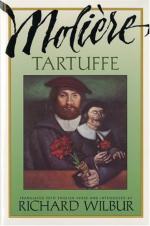|
This section contains 6,182 words (approx. 21 pages at 300 words per page) |

|
SOURCE: “Desire, Disclosure, and Power: Molière's Unmasking of Hegemonic Ideology,” in Romance Languages Annual, Vol. 6, No. 1, 1994, pp. 144-50.
In the following essay, Riggs discusses the relationships between desire, discourse, and the institutionalized world as presented in Molière's comedies.
… the ocularcentrism of modernity, the hegemony of vision, the the installation of the reign of the despotic eye, is also a verbocentrism, the consciousness of the book, and an egocentrism, the consciousness of a separated, detached atom of individuality.—Robert D. Romanyshyn
In his Jameson, Althusser, Marx, William Dowling demonstrates that an ideological discourse contains a system of abstract rules and implies a system of concrete institutions. I would argue that such a discourse is, in fact, constituted by the ambition or desire to produce such a system of institutions, such a social and cultural world. The discourse and the institutions constitute, legitimate, and perpetuate one another. I...
|
This section contains 6,182 words (approx. 21 pages at 300 words per page) |

|


